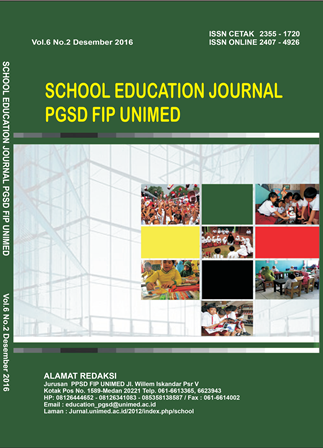MENINGKATKAN PRESTASI BELAJAR IPS DENGAN PENDEKATAN PEMBELAJARAN LEARNING COMMUNITY DI KELAS VII-1 SMP NEGERI 3 TEBING TINGGI
DOI:
https://doi.org/10.24114/sejpgsd.v6i2.5917Abstract
ABSTRAK Penelitian ini bertujuan untuk melihat peningkatan prestasi belajar siswa. Pendekatan yang digunakan adalah pendekatan pembelajaran learning community. Hasil pembelajaran kondisi awal IPS Kompetensi Dasar mendeskripsikan keragaman bentuk muka bumi, proses pembentukan dan dampaknya terhadap kehidupan melalui pendekatan learning community diperoleh data dimana pada masa prasiklus mencapai rata “ rata 63,33 dan hanya 50 % siswa mencapai nilai 70 atau > 70. Padahal idealnya minimal harus mencapai 100% siswa mendapat 70 atau > 70. Hasil belajar pada siklus I terdapat kenaikan prestasi belajar berupa rata “ rata kelas menjadi 69,89 dan sebanyak 65 % siswa memperoleh nilai tuntas. Nilai terendah adalah 50 dan nilai tertinggi adalah 90. Hasil belajar pada siklus II terdapat kenaikan prestasi belajar berupa rata “ rata kelas menjadi 83.3 dan sebanyak 90 % siswa memperoleh nilai tuntas. Nilai terendah adalah 70 dan nilai tertinggi adalah 100. Kata Kunci : Prestasi Belajar, Learning CommunityDownloads
Published
Issue
Section
License
Authors whose manuscripts are approved are approved as follows:
The publication rights for all journal manuscript materials published/published on the SEJ (School Education Journal) E-Journal site are held by the editorial board with the author's knowledge (moral rights remain with the manuscript authors).
The formal legal requirements for accessing this electronic digital journal article are subject to the terms of the Creative Commons Attribution-ShareAlike (CC BY) license, which means that E-Journal SEJ (School Education Journal) has the right to store, transfer media/format, manage in the form of a database, maintain, and publish articles without asking permission from the author as long as the author's name remains as the copyright owner.
Manuscripts published/published electronically are open access for educational, research, and library purposes.

